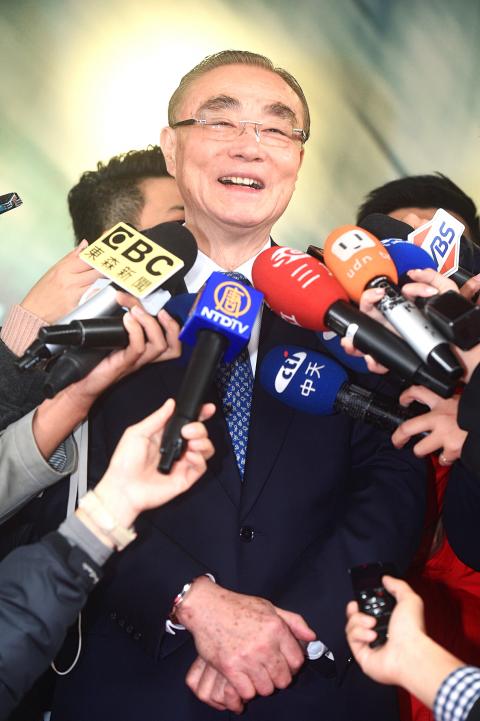China sailing its aircraft carrier near Taiwan has highlighted the need for the nation to go ahead with a plan to build its own submarines, Minister of National Defense Feng Shih-kuan (馮世寬) said yesterday.
The indigenous submarine project would not only protect the nation’s territorial security, but also allow Taiwan to contribute to regional security, Feng said at the opening of an exhibition on the history of the navy’s submarine fleet.
In what was seen by many as saber-rattling by Beijing, the Liaoning, China’s first aircraft carrier, sailed south in the Pacific Ocean off Taiwan’s eastern coast on Christmas Day before entering the South China Sea.

Photo: George Tsorng, Taipei Times
On Wednesday, the Liaoning passed through the Taiwan Strait on its way back to its base in northeastern China after conducting training exercises in the South China Sea.
The last time the aircraft carrier transited the Taiwan Strait was in November 2013.
At the ceremony, Feng said that the Ministry of National Defense publicized information to inform the public on the Liaoning’s movements, but stressed that “no special situations” were detected.
According to standing plans for the manufacturing of submarines, the ministry has been negotiating with CSBC Corp, Taiwan (台灣國際造船), the intended contractor, the ministry said, adding that if all goes according to plan, a prototype for the first submarines would undergo combat trials in 2024 and enter service in 2025.
Separately yesterday, former American Institute in Taiwan director Douglas Paal told the Central News Agency that recent aerial and maritime exercises by China’s armed forces near Taiwan were an example of Beijing showcasing its growing military strength and not a show of force directed at Taipei.
“As long as China’s military capabilities continue to grow, we expect to see Beijing expand its maritime activities in the days ahead,” Paal said.
Asked about saber-rattling by Beijing and demands that US president-elect Donald Trump abide by the “one China” policy, Paal said that as Trump has yet to assume office, all China can do is to issue stern statements to express its displeasure.
However, regarding Beijing’s recent threat to “take revenge” if Trump moves away from the “one China” policy, Paal said that the warning is real.
Asked if he expected Beijing to continue its effort to poach Taiwan’s diplomatic allies, such as the severing of diplomatic relations with Sao Tome and Principe on Dec. 20, Paal said the incident with the west African nation was probably driven by interests other than China’s desire to punish Taiwan.
Additional reporting by Aaron Tu

CHAOS: Iranians took to the streets playing celebratory music after reports of Khamenei’s death on Saturday, while mourners also gathered in Tehran yesterday Iranian Supreme Leader Ayatollah Ali Khamenei was killed in a major attack on Iran launched by Israel and the US, throwing the future of the Islamic republic into doubt and raising the risk of regional instability. Iranian state television and the state-run IRNA news agency announced the 86-year-old’s death early yesterday. US President Donald Trump said it gave Iranians their “greatest chance” to “take back” their country. The announcements came after a joint US and Israeli aerial bombardment that targeted Iranian military and governmental sites. Trump said the “heavy and pinpoint bombing” would continue through the week or as long

TRUST: The KMT said it respected the US’ timing and considerations, and hoped it would continue to honor its commitments to helping Taiwan bolster its defenses and deterrence US President Donald Trump is delaying a multibillion-dollar arms sale to Taiwan to ensure his visit to Beijing is successful, a New York Times report said. The weapons sales package has stalled in the US Department of State, the report said, citing US officials it did not identify. The White House has told agencies not to push forward ahead of Trump’s meeting with Chinese President Xi Jinping (習近平), it said. The two last month held a phone call to discuss trade and geopolitical flashpoints ahead of the summit. Xi raised the Taiwan issue and urged the US to handle arms sales to

State-run CPC Corp, Taiwan (CPC, 台灣中油) yesterday said that it had confirmed on Saturday night with its liquefied natural gas (LNG) and crude oil suppliers that shipments are proceeding as scheduled and that domestic supplies remain unaffected. The CPC yesterday announced the gasoline and diesel prices will rise by NT$0.2 and NT$0.4 per liter, respectively, starting Monday, citing Middle East tensions and blizzards in the eastern United States. CPC also iterated it has been reducing the proportion of crude oil imports from the Middle East and diversifying its supply sources in the past few years in response to geopolitical risks, expanding

Pro-democracy media tycoon Jimmy Lai’s (黎智英) fraud conviction and prison sentence were yesterday overturned by a Hong Kong court, in a surprise legal decision that comes soon after Lai was jailed for 20 years on a separate national security charge. Judges Jeremy Poon (潘兆初), Anthea Pang (彭寶琴) and Derek Pang (彭偉昌) said in the judgement that they allowed the appeal from Lai, and another defendant in the case, to proceed, as a lower court judge had “erred.” “The Court of Appeal gave them leave to appeal against their conviction, allowed their appeals, quashed the convictions and set aside the sentences,” the judges